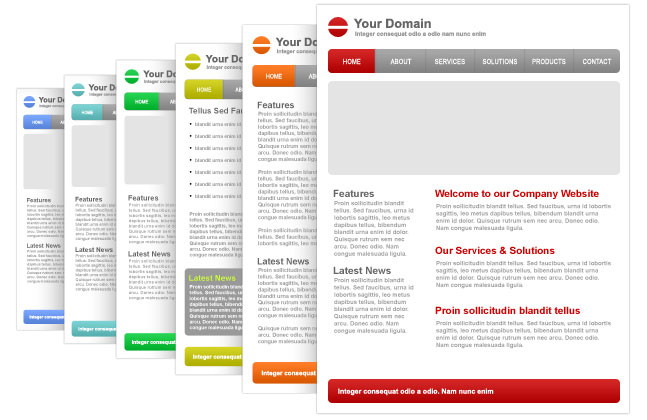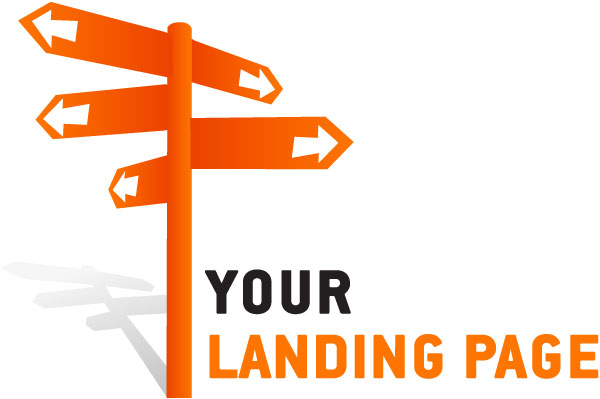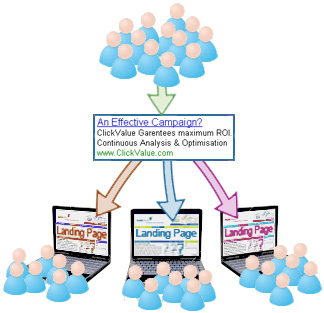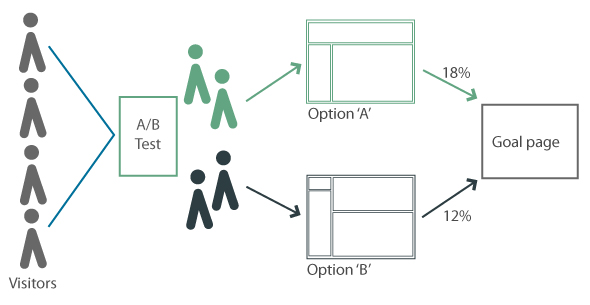 The first thing that most people think when they want to boost their online sales is to increase their website traffic. Thus they focus on getting more links, achieving better Search Engine Rankings, investing more on advertising, sending more emails and newsletters, finding more affiliates, becoming more active on Social Media and using other ways that can help them increase the number of their visitors. But is this always the right approach? Certainly not! Before spending all of your resources on trying to acquire expensive traffic, you should first ask yourself: “Are my landing pages optimized? Do they help me generate sales?”
The first thing that most people think when they want to boost their online sales is to increase their website traffic. Thus they focus on getting more links, achieving better Search Engine Rankings, investing more on advertising, sending more emails and newsletters, finding more affiliates, becoming more active on Social Media and using other ways that can help them increase the number of their visitors. But is this always the right approach? Certainly not! Before spending all of your resources on trying to acquire expensive traffic, you should first ask yourself: “Are my landing pages optimized? Do they help me generate sales?”
The Landing Page Optimization is probably one of the most important but at the same time ignored part of the Online Marketing strategy. Have in mind that in many cases, increasing your traffic by 10% will not have the same impact on your revenues as improving your conversion rates by the same percentage. This is primarily due to the fact that increasing your traffic incurs several costs that can squeeze your profit margins. Thus as we discussed on a previous article building effective landing pages should be a top priority in order to improve your conversion rates and increase your sales.
That is why in this article we discuss the 10 most common Landing Page Optimization mistakes and we explain how these problems affect the online marketing campaign:
1. Hidden or Unclear Call to Action
As we said in a previous blog post, the Call to action is a simple way to interact directly with your visitors and encourage them to take an immediate action (such as buy, call, subscribe, register, download etc) after visiting your website or viewing your page. The call to action should be distinctive, it should be visible on the top of the page and it should communicate a clear message to your readers. Failing to use clear call to action or failing to focus the user attention on it, is something that can definitely lead to lower conversion rates.
2. Having too much Text
Having too much text on the landing pages of your website is not helpful for your visitors. Keep in mind that the landing page should get the user’s attention and make him/her understand the basic features of your product/service. The rule “less is more” applies in this situation. Present to the user the most importantaspects of your product/service and provide him a way to read more details if he wants. Use clever graphics/visuals to pass hidden messages and don’t forget that a picture is worth a thousand words.
Now I am sure that many SEOs will argue that such an approach will have a dramatic impact on the SEO strategy of the website. Think again! There are several ways to add this text below the fold (where it will not distract the users) or use JavaScript/jQuery to hide and show the content in case they want to get more information. There are several ways to solve this problem technically. Just think out of the box and have in mind that visitors have limited time and thus you have only few seconds to get their attention.
3. Too many Links/Choices
Providing too many choices to the users is not advised since it can confuse them and make them leave your website. Make your users navigate easier on your site and increase the odds of focusing them on the Call to Action by keeping the number of choices short. This applies especially when the visitor lands on the page from an Adwords or PPC advertisement.

Again you don’t have to sacrifice your SEO campaign and destroy the Link Architecture of your website in order to create effective Landing Pages. You can resolve these issues easily by using several web development techniques and by implementing clever designs. The links can remain on the page as long as you focus the user attention on the choices that you want him/her to make.
4. Visual Distractions
Avoid at all costs any visual distractions that will make user ignore the call to action. Removing flashing advertising banners, floating boxes, popups or any other similar distractions is essential to increase the conversion rates. Keep in mind that using too many call to actions on the same page can also be considered as a distraction. Even though you can have more than one call to actions on the same page, make sure you prioritize them and not confuse/distract the user from your main goal.
5. Request too many information on the forms
In many cases the landing pages contain HTML Forms where the visitor has to fill in his/her information in order to proceed (download, buy, subscribe, register, contact sales etc). If possible eliminate the forms that are not necessary since they are considered as barriers by many users. In case they are needed, try to request from the user only the information that is absolutely necessary and avoid asking for things that are not useful/relevant or that he/she might be reluctant to provide immediately. Don’t forget that you can ask later for this information, once you gain the trust of the user.
6. Message Mismatch
It’s a common mistake to use Advertising campaigns with misleading texts in order to drive traffic to the landing page. A message mismatch between the ad and the landing page can lead to high bounce rates and low conversions. By using misleading ads not only you attract not-targeted traffic and you waste your resources but also you risk getting banned by the advertising networks since this is a clear violation of their Terms of Use. The same applies not only for ads but also for all of your promotional campaigns and links that you place across the web.

7. Lack of Trust
Another reason why you might have low conversion rates is because the potential clients that visit your website do not trust you. In order to resolve this problem first of all make sure you have a well designedwebsite which is an indication that you are a serious company. Also make sure you include the logos and reviews of your satisfied clients or provide reviews from experts of the industry. Finally keep in mind that you should include in a visible position any Trust Seals or Badges that show that you website is safe for online transactions.
8. Not tracking the results of your landing pages
In order to be able to optimize a landing page, you must be able to know how well it performs. A major mistake that lots of people make is that they don’t monitor and track the results of their landing pages. Make sure you invest time and effort on reviewing your traffic logs, tracing the behaviour of the user within your website and above all track every click of the user by using Google Analytics Event Tracking or Virtual Pageviews or similar techniques. This information will be invaluable for you when you start evaluating and optimizing the results of each landing page.
9. Not testing the results of your landing pages
If you don’t test different versions of the landing page you can’t be sure that it works properly (or how well it works). By using A/B testing you can get lots of useful data about the behaviour and needs of the user and use this information to improve your pages and make the right marketing decisions. Don’t forget that in order to be able to evaluate the results of the A/B testing you need gather results over a period of time and of course to set all the necessary mechanisms that will help you monitor the results of each page. Google’sWebsite Optimizer is a useful service that can help you perform such tests, nevertheless there are several other solutions and tools that you can use.

10. Not optimizing your Landing Pages
Webmasters and Online Marketers optimize their Ad/SEO/Social Media/Online Marketing campaigns all the time. Why should not we do the same for the Landing Pages? Redesigning the Landing Pages of the website by taking into account the results that we track, the A/B testing and the feedback from the users is absolutely necessary in order to improve the conversion rates. Don’t forget that it’s your client that should “design” your website and not your Web Designer or Online Marketing consultant. And since different clients have contradictory needs you need to find a solution that satisfies most of them. This can only be done by dedicating time and effort on monitoring, testing and optimizing your landing pages.
The Landing Page Optimization is a difficult and challenging task that requires you to present the information in an optimal way, to know your clients and understand their needs, to monitor closely the performance of the pages and to invest time and effort on improving their results and on trying new approaches. Still Landing Page Optimization is not rocket science and as a result in many cases by dedicating the appropriate time you can achieve very good results just by making few targeted changes on your marketing approach.




No comments:
Post a Comment